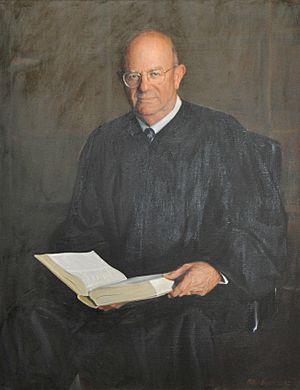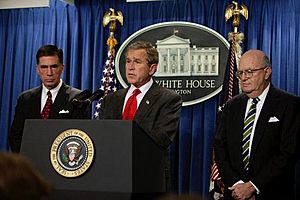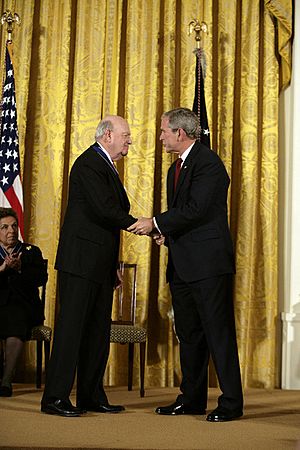Laurence Silberman facts for kids
Quick facts for kids
Laurence Silberman
|
|
|---|---|
 |
|
| Chair of the Iraq Intelligence Commission | |
| In office February 6, 2004 – March 31, 2005 Served with Chuck Robb |
|
| President | George W. Bush |
| Preceded by | Position established |
| Succeeded by | Position abolished |
| Judge of the United States Foreign Intelligence Surveillance Court of Review | |
| In office June 18, 1996 – May 18, 2003 |
|
| Nominated by | William Rehnquist |
| Preceded by | Robert W. Warren |
| Succeeded by | Ralph K. Winter Jr. |
| Senior Judge of the United States Court of Appeals for the District of Columbia Circuit | |
| In office November 1, 2000 – October 2, 2022 |
|
| Judge of the United States Court of Appeals for the District of Columbia Circuit | |
| In office October 28, 1985 – November 1, 2000 |
|
| Nominated by | Ronald Reagan |
| Preceded by | Seat established by 98 Stat. 333 |
| Succeeded by | Brett Kavanaugh |
| United States Ambassador to Yugoslavia | |
| In office May 8, 1975 – December 26, 1976 |
|
| President | Gerald Ford |
| Preceded by | Malcolm Toon |
| Succeeded by | Lawrence Eagleburger |
| 14th United States Deputy Attorney General | |
| In office January 20, 1974 – April 6, 1975 |
|
| President | Richard Nixon Gerald Ford |
| Preceded by | William Ruckelshaus |
| Succeeded by | Harold R. Tyler, Jr. |
| United States Under Secretary of Labor | |
| In office 1970–1973 |
|
| President | Richard Nixon |
| Preceded by | James Day Hodgson |
| Succeeded by | Richard F. Schubert |
| United States Solicitor of Labor | |
| In office 1969–1970 |
|
| President | Richard Nixon |
| Preceded by | Charles Donahue |
| Succeeded by | Peter Nash |
| Personal details | |
| Born |
Laurence Hirsch Silberman
October 12, 1935 York, Pennsylvania, U.S. |
| Died | October 2, 2022 (aged 86) Washington, D.C., U.S. |
| Political party | Republican |
| Spouses | Ricky Gaull Patricia Winn |
| Children | 3, including Robert |
| Education | Dartmouth College (BA) Harvard University (LLB) |


Laurence Hirsch Silberman (October 12, 1935 – October 2, 2022) was an important American lawyer, diplomat, and judge. He served as a federal judge on the U.S. Court of Appeals for the D.C. Circuit from 1985 until his death.
President Ronald Reagan appointed him in October 1985. Later, in 2000, he took on a "senior status" role, which means he continued to work but with a reduced caseload. In 2008, President George W. Bush gave him the Presidential Medal of Freedom, one of the highest awards a civilian can receive in the U.S.
Contents
Early Life and Learning
Laurence Silberman was born in York, Pennsylvania, on October 12, 1935. He went to Dartmouth College, where he earned a degree in history in 1957.
After college, he served for six months in the United States Army. He then studied law at Harvard Law School, graduating in 1961.
A Career in Public Service
Silberman had a long and varied career, working both as a lawyer in private companies and in many important government roles.
Early Government Roles
He started his government service at the National Labor Relations Board. From 1969 to 1970, he was the Solicitor of Labor. In this role, he helped create rules for something called "affirmative action," which aimed to ensure fair opportunities for everyone. He later felt that some of these rules led to specific numbers being required, which he thought was not the original goal.
From 1970 to 1973, he served as the Undersecretary of Labor. During this time, he worked on new laws to help solve disagreements between workers and employers.
Deputy Attorney General
In 1974, President Richard Nixon chose Silberman to be the Deputy Attorney General for the United States. This was a very important job in the Justice Department.
One of his tasks was to look through secret files kept by J. Edgar Hoover, the former head of the FBI. Silberman described this as a difficult experience. He even suggested that the FBI building should not be named after Hoover because of what he found.
Silberman also briefly served as the Acting Attorney General during the Watergate scandal, a major political event in the 1970s.
Ambassador to Yugoslavia
In 1975, President Gerald Ford appointed Silberman as the U.S. Ambassador to Yugoslavia. He worked in this role until 1976. As an ambassador, he helped free an American citizen who had been wrongly imprisoned.
He also advised Ronald Reagan on foreign policy during Reagan's 1980 presidential campaign. Silberman held several other important positions related to arms control and defense policy. He was known for being confirmed for six different government jobs without any opposing votes.
Becoming a Federal Judge
On September 11, 1985, President Ronald Reagan nominated Laurence Silberman to become a judge on the United States Court of Appeals for the District of Columbia Circuit. This court is very important because it often handles cases involving the U.S. government.
The United States Senate approved his nomination, and he officially became a judge on October 28, 1985. He continued to serve on this court until his death in 2022.
Supreme Court Consideration
Silberman was considered three times for a position on the U.S. Supreme Court. However, after another judge, Robert Bork, was not approved for the Supreme Court, Silberman was seen as a more debated choice.
Important Judicial Work
In 2002, he was part of the first-ever session of the United States Foreign Intelligence Surveillance Court of Review. This court reviews decisions made by a special court that oversees government surveillance.
In 2004, he was chosen to co-lead the Iraq Intelligence Commission. This group was created to investigate the intelligence information the U.S. had before the 2003 invasion of Iraq.
In 2008, Judge Silberman and five other judges filed a lawsuit against the U.S. government. They argued that judges should receive cost-of-living pay raises. They won the case, which led to a pay increase for all federal judges.
In 2015, Silberman wrote an article in The Wall Street Journal. He compared accusations against President Bush about the Iraq war to similar false claims that helped the Nazis rise to power.
He received several awards for his judicial service, and many people in the legal field considered him one of the most influential judges who never served on the Supreme Court.
Teaching and Academia
Besides his work as a judge and government official, Silberman also taught law. He was a lecturer at the University of Hawaiʻi early in his career.
Later, he became a professor at Georgetown University Law Center and also taught at NYU and Harvard. He taught subjects like administrative law and labor law. He received awards for his teaching and service from various legal organizations.
Family and Friends
Laurence Silberman was married twice. His first wife, Rosalie "Ricky" Gaull Silberman, passed away in 2007. He later married Patricia Winn Silberman. He had three children: Robert S. Silberman, Kate Fischer, and Anne Otis. He also had eight grandchildren, including screenwriter Katie Silberman.
He was close friends with two U.S. Supreme Court Justices, Antonin Scalia and Clarence Thomas. He encouraged Justice Thomas to become a federal judge. Several of his former law clerks, who are like assistants to a judge, have also become federal judges, including U.S. Supreme Court Justice Amy Coney Barrett.
Laurence Silberman passed away on October 2, 2022, at the age of 86.
 | Lonnie Johnson |
 | Granville Woods |
 | Lewis Howard Latimer |
 | James West |

